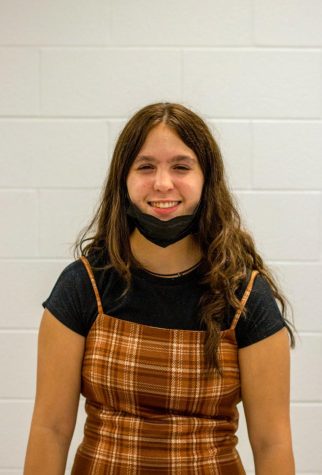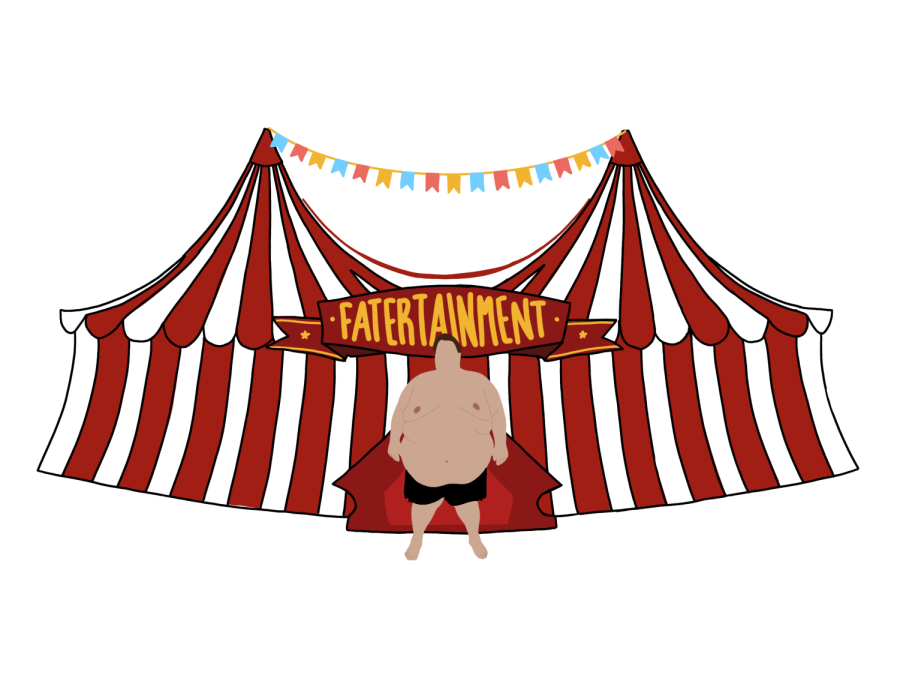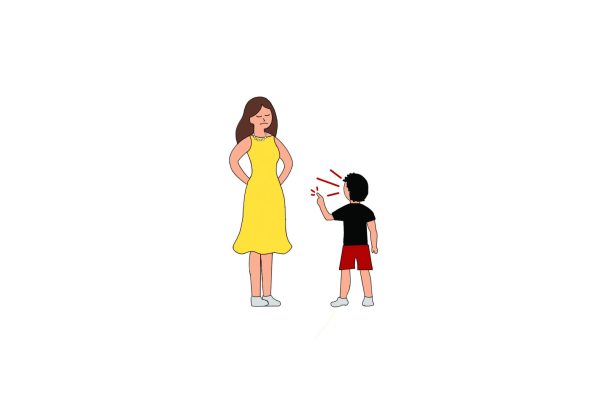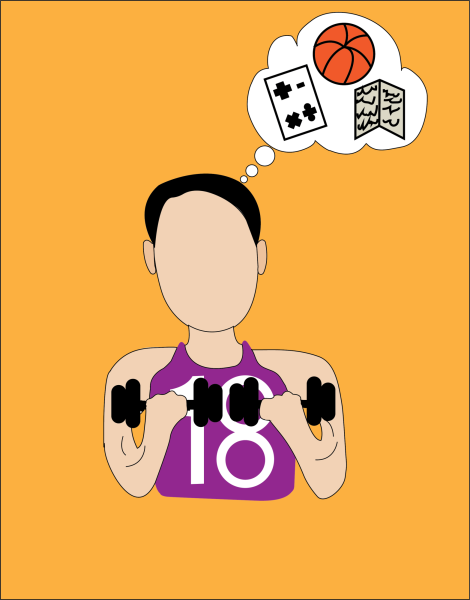“Fatertainment” is getting out of hand
Digital illustration depicting a “fatertainment” star being likened to a circus commodity.
The topic of weight has become a prominent aspect of reality television in America. Though these programs do not necessarily portray obesity in a particular light, they can impose harmful stereotypes concerning weight gain and loss.
If your only exposure to severely overweight people is from the increasing reality shows surrounding fat people, such as TLC’s popular “My 600-lb Life” or USA Network’s “The Biggest Loser,” you might think all fat people stuff their stomachs with food and then cry about it later, crumbs on faces and sweat on flabby body parts.
But this narrative is far from the truth. I come from a family with a history of severe weight issues. And unlike what these reality shows tell you, obesity can occur from a number of hidden factors. The obese people shown on our televisions should not be treated as the freak show animals they are made out to be.
The fact of the matter is that these reality shows equate fatness with failure. They are not about showcasing life stories and weight loss, they are about harmful stereotypes and exploitation of overweight people, while claiming to be authentic. These shows normalize hateful fatphobic speech and dramatize unnecessary scenes, such as “My 600-lb Life”’s never-ending shower scene, leaving people vulnerable and stripped of their dignity, all in an attempt for views.
It could be argued that while these shows are made to make a spectacle out of fat people, the contestants are willingly putting themselves on television, and most importantly, being well paid for their efforts. It is apparent that most contestants feel the need to get essential medical bills paid, and some sort of salary they can obtain while living at home. However, contestants are typically paid a flat rate fee of $1,500, usually referred to as a “talent fee.” With the fact that filming occurs over the course of a year, this rate is ridiculously low.
To put this into perspective, Lisa Rinna, one of the stars of “The Real Housewives of Beverly Hills” allegedly makes $405k per episode. When put into comparison, the salaries given to the stars of various “fatertainment” reality shows don’t even come close to this amount. Additionally, Lisa Rinna does not face the judgment, humiliation and harassment like the stars on “My 600-lb Life,” while also making a disgustingly low salary for the outcome of the show.
Although some of these reality shows advertise their goal of increasing morality and support for obese people, your average fan of these shows is not watching to see the contestants’ weight loss because of their love and support for them. Contrary to what some may suggest about these shows’ main viewers, TLC’s YouTube views clearly favor videos portraying weight gain in an entertaining light, rather than a serious one. For example, the video “He only goes outside for the Ice cream man” has received 2.4 million views in two years, whereas “Joe’s incredible weight loss journey” has only had 1.8 million views in six years. Weight-loss videos take up the majority of TLC’s lower views, and if they show people losing too much weight, they are at the very bottom. Viewers respond to struggle and shock content because it allows them to feel superior to their peers, and media companies are well aware of this.
Most of these TV stars are filmed performing humiliating acts due to their size. For an episode of TLC’s “Family by the Ton,” Casey King bathes in a trough, a product intended for animals. During the episode, King says, “I have to move around almost like a pig… I have to roll around and lift up pieces of my skin.”
The manipulated, slow-pan of the camera and shots of King wearing little clothing are done intentionally to show just how huge and beastly he is in appearance, while dramatic splashing sounds and his heavy breathing are enhanced. Like other TLC YouTube videos, the thumbnail shows King exposed and flopping heavily into the trough, like an animal showcase from National Geographic.
Being a slightly overweight person is hard enough in an extremely standardized society, but suffering from obesity apparently makes you undeserving of kindness or encouragement, when that should be the immediate priority for these people, some of whom are at-risk of death. In an article for ObesityHelp, Dr. Nowzaradon (Dr. Now), the infamous Iranian surgeon from “My 600-lb Life,” mentioned that obesity is a “metabolic and genetic disposition that people have, and is a disease and needs to be treated as a disease.” Dr. Now added that “ everybody comes and we take care of them.” He is essentially saying that obesity is not something to be taken lightly, and himself and his staff aims to help every struggling person who goes through their doors no matter the circumstances.
This is a very compassionate and true approach to an increasing issue. It is crucial for the average reality TV watcher to understand that while it is undeniable that severely obese people are responsible for their health alone, factors such as wealth, genetics and family life all play a part in a person’s weight struggle.
On the topic of disease, the lack of discussion about many of these TV stars’ disordered eating patterns is absurd. The equation to obesity is not always as simple as ‘laziness plus junk food,’ but rather involves serious mental health issues and conditions concerning food. While “My 600-lb Life” does shed a brief spotlight on familial history and childhood neglect (the interesting, yet sad drama!), it ignores the disordered eating and mental health aspect that is arguably the biggest cause of these individuals’ weight. Shows like this not only shame their contestants while lacking consistent therapy so they can actually better their lives, they do not even mention this major factor in the first place.
While it is evident that reality TV is full of scripted fights, lies and drama, these are real people with real interests, hopes and dreams. Obese people exist outside of these shows, and once we understand that not every obese person is an emotional mess who acts in violent outbursts to the thought of a healthy diet, we can begin to improve the stigma around fat people.
I am not saying that being obese is healthy or should be celebrated by society. Rather, I am saying that the only thing these reality shows do well is portray a sluggish fat person, rather than garner the needed empathy to show the daily life of an obese person, as they all claim to do.

Quinn Brown is a senior and writer for “The Express.” This is her second year on staff. Outside of newspaper, she is involved in NHS, Chorale, and a book club with her friends. She is a coffee addict. In her free time, she likes watching studio ghibli films, playing with her dog Copper, crunching fall leaves, writing stories and reading. Her favorite books include classics and Greek mythology like “The Iliad,” and her favorite bands are Dayglow and Glass Animals. Quinn is overall extremely eager to write for the newspaper this year, and is ready to improve her writing skills and produce great articles!

Regan Simeon is a senior and the Social Media Editor of BVNWnews. This is her second year on staff and she previously served as a photographer and designer for “The Express”. Outside of publications she is a member of NHS, NEHS, Quill & Scroll, Medical Club, Mental Health Board as well as the Communications Manager for the Executive Board of Student Government. Outside of school she spends her time at Above the Barre Dance Academy as a competitive dancer on the studio’s company team as well as an assistant and teacher. In her free time she enjoys spending time with friends, binge watching TV shows and going to the movie theater. Regan is eager to kick the year off and is looking forward to bettering and expanding Northwest’s social media presence.







